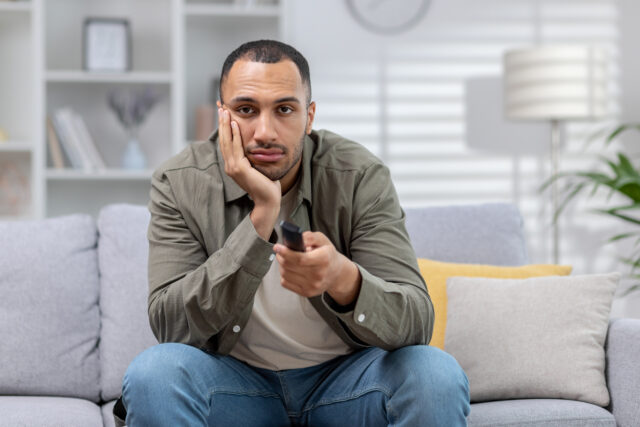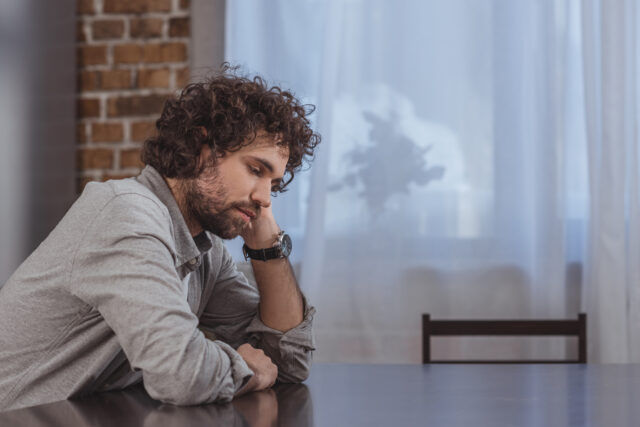Ever feel like the world is just too much and your safe space is the only place you truly belong?

We all need some alone time now and then, but if you’ve been isolating yourself for a while and feeling an overwhelming desire to stay home, it might be more than just introversion. It could be a sign of Hikikomori Syndrome, a complex phenomenon where people withdraw from society and isolate themselves at home. Don’t worry, you’re not alone in this, and recognising the signs is the first step towards understanding and addressing it.
1. You dread social interactions and avoid them at all costs.
 Source: Unsplash
Source: Unsplash Parties, family gatherings, even a casual coffee with a friend – the thought of socialising fills you with anxiety and dread. You might find yourself making excuses to avoid these situations or feeling physically ill at the mere prospect of interacting with people. This isn’t just about being shy; it’s a deep-seated aversion to social contact that can be overwhelming.
2. Leaving your house feels like an insurmountable challenge.

Going to the grocery store, attending school or work, even stepping outside for fresh air – it all feels like an enormous hurdle you can’t overcome. You might find yourself procrastinating on errands, calling in sick to work, or simply refusing to leave the house altogether. This isn’t laziness; it’s a feeling of being trapped within your own home.
3. You spend most of your time alone in your room.

Your room isn’t just a place to sleep; it’s your sanctuary, your fortress of solitude. You might spend hours browsing the internet, playing video games, watching TV shows, or simply staring at the walls. While some alone time is healthy, spending an excessive amount of time isolated in your room can be a sign of withdrawal from the world.
4. You feel a deep sense of shame and guilt about your isolation.

You know that your behaviour isn’t “normal,” and you might feel ashamed or guilty about not being able to function like everyone else. You might compare yourself to other people and feel like a failure for not being able to hold down a job, maintain relationships, or simply leave the house. This self-blame can further fuel your isolation and make it harder to reach out for help.
5. You have difficulty maintaining relationships with friends and family.

As your isolation deepens, you might find it increasingly difficult to connect with the people you care about. You might stop returning calls and messages, cancel plans at the last minute, or simply avoid contact altogether. This isn’t because you don’t care about them; it’s because the anxiety and pressure of maintaining relationships become too much to handle.
6. You struggle with feelings of depression and hopelessness.

The isolation and withdrawal associated with Hikikomori can lead to a downward spiral of negative emotions. You might find yourself feeling sad, empty, and hopeless most of the time. You might lose interest in activities you once enjoyed, have difficulty sleeping or eating, and experience thoughts of self-harm or suicide. These feelings are serious and shouldn’t be ignored.
7. You have difficulty concentrating and making decisions.

The constant anxiety and stress of living in isolation can take a toll on your cognitive function. You might find it difficult to focus on tasks, remember things, or make simple decisions. You might feel mentally foggy and struggle to keep up with schoolwork, work responsibilities, or even daily chores. This cognitive impairment can further contribute to your feelings of inadequacy and isolation.
8. You feel disconnected from reality and the outside world.

As you withdraw from society, you might start to feel like you’re living in your own little bubble, disconnected from the real world. You might lose touch with current events, cultural trends, and even the daily routines of life outside your home. This feeling of detachment can be both comforting and unsettling, as you find yourself drifting further away from the life you once knew.
9. You have lost interest in hobbies and activities you once enjoyed.

Maybe you used to love playing sports, painting, or going to concerts, but now those things seem like distant memories. You might find it difficult to muster up the energy or enthusiasm to engage in activities you once found pleasurable. This lack of interest isn’t just a temporary slump; it’s a sign of a deeper emotional disconnect and withdrawal from the world.
10. You have difficulty sleeping or experience excessive sleepiness.

Your sleep patterns might be disrupted, with difficulty falling asleep, staying asleep, or waking up feeling refreshed. You might also experience excessive daytime sleepiness, even after getting a full night’s rest. These sleep disturbances can be a sign of underlying anxiety, depression, or other mental health issues related to Hikikomori.
11. You experience physical symptoms such as headaches, stomachaches, and fatigue.

The stress and anxiety of isolation can manifest in physical ailments. You might experience frequent headaches, stomachaches, fatigue, or other unexplained physical symptoms. These aren’t just imaginary; they’re real manifestations of the toll that Hikikomori is taking on your body and mind.
12. You have thoughts of self-harm or suicide.
 Source: Unsplash
Source: Unsplash If you’re experiencing suicidal thoughts or urges to harm yourself, please seek professional help immediately. You can reach Samaritans 24 hours a day, 365 days a year at 116 123 or the National Suicide Prevention Helpline at 0800 689 5652. These feelings are serious and shouldn’t be taken lightly. There are resources available to help you through this difficult time.
13. You feel a strong desire to escape from your current situation but don’t know how.
 Source: Unsplash
Source: Unsplash You might feel trapped in your isolation, longing for a way out but feeling powerless to change your circumstances. You might daydream about a different life, a life where you’re free from the anxiety and fear that hold you back. This desire for escape is a sign that you’re not content with your current situation and that you’re yearning for something more.




